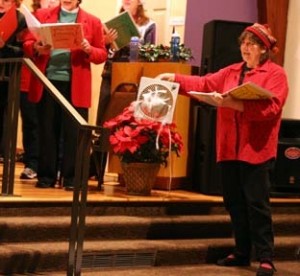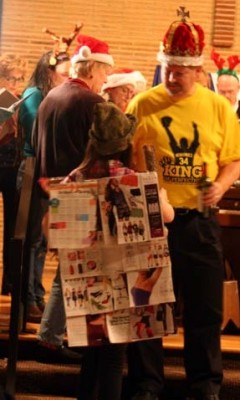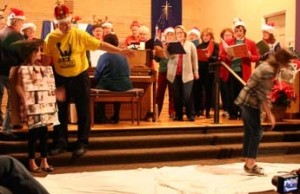The Rehabilitation of Good King Wenceslas
Let’s review all the reasons “Good King Wenceslas” is a great carol. From a piano teacher’s point of view, it’s an easy one for beginners, especially small children who have just started learning piano in September. By December, “Good King Wenceslas” is a good teaching piece. That’s about it. Or that’s what I thought two months ago when I asked The OK Chorale which traditional carols they wanted to sing this quarter and Hal The Baritone suggested “Good King Wenceslas.”
I couldn’t imagine anything more boring. Melodically two of the lines in each of the five verses are exactly the same. Rhythmically the song is 75% quarter notes which means it yaps along like an annoying small dog.
“It’s boring,” I said
“It’s a dialogue,” he said
I looked at it again. This time I read the verses. “It’s a little play,” I thought, “Hmmm.”
I passed out copies of the song with a little note attached: “I am only agreeing to do this on the condition that we come up with a way to break the musical monotony. So start designing those costumes and figuring out a way to make snow.” Who was I kidding? I was the one who’d have to make snow. The Snowmaker, that’s me. I made a list of all the nouns in the song and put out a request for props. I asked Hal if his granddaughters who have yearly enjoyed the OK Chorale Christmas concerts would want to participate.
He reported back the next week. “They’re in,” he said. “We’re arguing over who gets to be king.”
Hal was crowned king. I brought him my crown from The Great Dalmuti.
“That’s a little girlie for me,” he said
He replaced it with one of those “Flavor so good it makes you feel like a king” crowns and a yellow T-shirt that said KING on it.
Wenceslas was not actually a king. He was just a duke. And really, Hal is just a baritone. Wenceslas was a tenth century Czech nobleman who was assassinated by his own brother, Boleslav the Cruel. Such a binary family. St Stephen’s Day is Dec 26 or 27 depending on which side you take in the War on Christmas.
The carol says that the Good King looks out his window at the moonlit snow on St Stephen’s Day. He sees a Poor Man gathering wood for a fire. He gets the neighborhood scuttlebutt on the Poor Man from his Page. The two of them set out with bread, wine, and meat, plodding through the wind and snow to the Poor Man’s dwelling. By verse four the Rude Wind has kicked up and the Page says he can’t continue. The Good King tells him to walk in his footsteps and so they continue. The song ends with the mild suggestion that when we bless the poor, we ourselves are blessed.
By mid-quarter we had assembled our props and the Dramatis Personae had been decided. Hal was the King, Kelsey would play The Poor Man, and Brianna would be The Page.
“How much rehearsal time is this going to eat up?” Nina (rhymes with Dinah) asked gloomily as we drove to the church. Nina is a high school teacher. She knows about trying to get anything done with large exuberant groups of people who don’t listen.
“Probably the whole evening,” I said thinking about all the music we still had to learn: the Latin song, the Ladino song and the Ethiopian song with words that that no one understood.
It was worth the time. Good King Wenceslas turned out to be my favorite part of the OK Chorale show this quarter:
Good King Wenceslas, a Treatment:
Five white sheets cover an area in front of the stage, not deep and crisp, just white. Strewn about are sticks and small logs from this year’s supply of wood for my wood stove. Anne (alto) holds a fan with crepe paper streaming from it in the direction of the audience so they can appreciate the ambiance. Nina (soprano) cuts most of the hall lights.
Verse One: At first mention of the moon, a powerful flashlight from Hal’s glove compartment is turned upon the side wall by Kathleen in the soprano section. The Good King sees The Poor Man gathering up sticks.
Verse Two: The Page appears dressed in a Robin Hood hat supplied by Chris (tenor) and wearing an outfit made of magazine pages designed by the girls’ mother, Monika.
Verse Three: The Page and the Good King get together a wine bottle supplied by Anne, and the rubber chicken supplied by Sandi (alto) that doubles as one of the French hens for “The Twelve Days After Christmas.” At first mention of the wind, Jody (soprano) Eileen and Chris ( tenors) and Kristin ( alto) fan the air (mostly in the direction of the director at the piano.)
Verse Four: The Wind becomes Rude. Jody, Eileen, Chris and Kristin fan more furiously.
Verse Five: The Page clomps across the snow in a pair of Hal’s shoes, trodding in The Master’s footsteps.
Jody, Chris, Eileen, and Kristin, having transubstantiated the fans into instruments of blessing, pronounce one.
I told Hal that Kelsey and Brianna were welcome to do something with us every Christmas until they start adolescing. I love this group. Something wonderful always happens and I always feel blessed with them. The transubstantiated fans just put the crown on it.
r
 RSS Feed
RSS Feed


It looks wonderful. I’m so sorry I had to miss it. Thanks for the pictures. It all makes sense now. {At least as much as possible.)
I would have like to see Stephen the Cruel skulking about in the rear of the stage. I don’t sing, but am good at skulking.